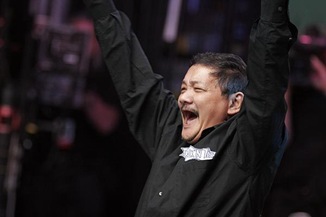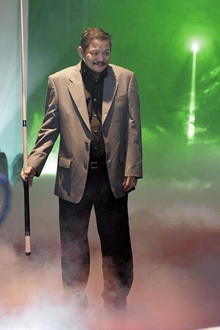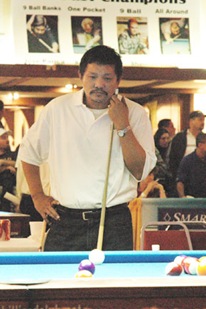 I chanced upon this article on Filipino pool legend Efren Bata Reyes, aka The Magician, one of the most celebrated and charismatic pool players who ever wielded a cue stick. It is perhaps the best anecdote ever written on the Billiards Congress of America's Hall of Famer. The post's author is Ted Lerner, sports commentator and official correspondent for the 2007 World Pool Championship. It was first published in the daily newspaper Business World, on 4-13-1996. Hey, wait! This is my 413th post! Coincidence? Maybe. Faith? Definitely! And I kid you not!
I chanced upon this article on Filipino pool legend Efren Bata Reyes, aka The Magician, one of the most celebrated and charismatic pool players who ever wielded a cue stick. It is perhaps the best anecdote ever written on the Billiards Congress of America's Hall of Famer. The post's author is Ted Lerner, sports commentator and official correspondent for the 2007 World Pool Championship. It was first published in the daily newspaper Business World, on 4-13-1996. Hey, wait! This is my 413th post! Coincidence? Maybe. Faith? Definitely! And I kid you not!
Working-class Hero
Efren "Bata" Reyes is more than just one of the best pool players in the world. To many, he is a living legend, writes TED LERNER.
IT IS A HOT and sunny Saturday afternoon in late March and Efren Reyes is putting on an exhibition.
The town is Angeles City, Efren's home town, and the place is Margarita Ville, a popular bar and restaurant on Field's Avenue. Efren has come here at the invitation of his American friend, John, the owner, for a day of some friendly pool.
The challengers today are mostly foreigners, who make up the majority of Margarita Ville's customers. They have lined up for a chance to take on the master, to get their picture taken with him, and to be able to one day say to their friends around the bar, "I once played against Efren Reyes, the greatest pool player in the world."
The bet for each match is P500. First man to win seven games wins the money. Of course, Efren has to give every challenger a major handicap. He practically gives the game away. In 9-Ball, where the balls have to be run consecutively until the winning nine ball is sunk, all the opponent has to do is sink the four, the six or the nine and he wins. And the opponent always gets to break. Even so, nobody expects to beat Efren.
Dressed in rolled up jeans, a short-sleeve polo shirt, and rubber slippers, Efren, the man they call "the magician" in the States because of his incredible shot making, works the table. Occasionally, he smokes a cigarette or laughs his endearing smile. One noticeable absence is Efren's front teeth. When he is on tour in the United States, he wears them, but when he is at home, he likes to relax.
Methodically, he disposes of one opponent after the next. He casually, seemingly effortlessly, sinks shot after shot, always leaving the cue ball in perfect position for the next shot. Often times, he runs all nine balls without a miss.
Efren does not like to call this an exhibition. To him, he is just doing what he has done practically every day since he was born 41 years ago: play pool. But to the 50 or so people gathered around the table, and to the 30 or so others peering from the sidewalk outside, it is as good as a clinic. They seem to watch with a reverence.
After several hours, the bar erupts in cheers. Efren has lost to the assistant manager, Jimmy, who sank the nine ball off the break in the very last game. Jimmy, relishing a moment he will never forget, pumps his fist in the air and received high fives from his friends. Efren, smiling, shakes Jimmy's hand and pulls out P500.
Then, to show what his accomplishment means, Jimmy strides over to the bar and rings the bell, thereby obligating himself to purchase a round of drinks for the entire establishment, a gesture that surely must have cost him at least P2,000. And, in a further sign of reverence and respect, Jimmy puts his P2,500 stick into retirement, by having Efren sign the shaft.
"Hell, I can always buy another cue," Jimmy says exuberantly. Several other foreigners come over and do the same thing.
Efren would go on to play for a total of six hours that night. He lost only one other match, having let one of the local bar girls win the last series of the night.
During a break, while Efren and his companions - his brother, a driver, and a valet - relaxed over cheeseburgers, fries and Cokes, I stopped over to say hello. I had met and interviewed Efren last year and he greeted me in his typical friendly manner. He invited me to sit down and he offered me his French fries.
While eating his cheeseburger he talked about going to the States again in June for the start of the 1996 Professional Billiards Tour. He then rattled off his victories and accomplishments from the 1995 Tour. In six months in the States, he won an incredible six tournaments and pocketed over $80,000. He captured the Sands Regent 9-Ball in Reno, Nevada. The prestigious Bicycle Club 9-Ball invitational in Los Angeles, the World 8-Ball championships in Las Vegas, the World Straight pool championship in Bangor, Maine, the Pro-Tour championship 9-Ball in Owensboro, Kentucky, and the Legend 9-Ball in LA. He also placed fifth at the world championships of 9-Ball in Norfolk, Virginia. At year's end, he was also voted International Player of the Year.
This should naturally be heady stuff for a guy who rose from Third World poverty and who now dominates the world's billiards scene. Efren, however, seems unaffected by his accomplishments. He even said his six months in the States was too long.
"I had to sign a contract with the Tour," he said. "I prefer three months. I like it here in the Philippines."
For it is here in the Philippines where he can get more of what he likes most - action.
"I cannot hustle in America because they know me already. Americans don't like big money games. If I like action, I stay in the Philippines."
In fact, when I first met Efren Reyes a year ago, I found him playing cards at his auntie's house in Angeles City. It had taken me one month to track him down. He is difficult to find. He is not the kind of guy who keeps a regular schedule or makes regular appearances that are published in the newspaper. Maybe in the States when he's on tour, but not in the Philippines. Here he is just living and partaking of that action he loves so much. One night he might be playing a quickly arranged money game of 9-Ball in Bulacan, another night he might be in Manila playing mahjong, or another day, he might be back in Angeles in cockfights.
In many ways, though, I found in my search for Efren Reyes, the perfect insight into the man and what he represents. Efren Reyes is a true, living Filipino folk hero, very much in an old fashioned sort of way. Word of mouth is how you find out where he was, and where he will be. Everybody knows, or claims to know him. Everybody can remember a spectacular and impossible shot they saw him make 10 or 15 years ago. Everybody remembers a time when they saw him do this or that.
Everybody will also tell you two things about Efren. He is the best player in the world when it comes to playing for money, and, he is an extremely down-to-earth, friendly guy.
At the Hang's 'N bar in Ermita, Tony Fuster, a long-time friend of Efren's, and a sharp pool player in his own right, said, "When it comes to playing for money, nobody is more focused than Efren."
Tony directed me to a bowling and billiards center in Farmer's Plaza, Cubao, where, as professional pool player Bert Aleonar said, "You have the best card players in the Philippines, the best pool players, the best gamblers, and the best cristos (bet takers)." This is where the finest pool players in the Philippines gather nightly to play and gamble for their daily bread. Efren often stops by Farmer's to play money games.
Bert has known Efren since the 1960s, when they were both teenagers. "He's a good friend," Bert said of Efren. "He's a simple, humble guy. He never judges other people."
In Efren's hometown of Angeles, I began to find out just how laidback the life of this hero was. He had been keeping his pool table and hanging out and practicing everyday at a nondescript carinderia that has no name located on a muddy side street next to McDonald's in Dau. Cezar Morales, the owner and a life-long friend of Efren, said Efren had just moved the table to his auntie's house in Angeles.
Efren's auntie's house is a modest cinder block abode. On the covered but open-air porch sat Efren's pool table, on which several kids were playing. Drying laundry hung around the table. Boxes and clutter were everywhere. On the ground, several roosters scurried under and around the table.
There must have been 50 people there when I arrived. Inside the house, several women played cards. In another room, several men, including Efren, were engaged in their own card game.
Efren, wearing a t-shirt, shorts and rubber slippers, was as friendly, low-key, and unassuming as everyone had said. I asked him if he could shoot some pool while I took pictures. Everybody gathered around the table to watch him practice. I am no expert, but even the little I saw of his play told me a lot.
The key in pool is control of the cue ball. He can do whatever he wants with it. When he plays, the cue ball moves around the table as if there is someone underneath with a magnet dragging it to the exact spot he wants it to go for the next shot. He is in total control. He claims that he looks three to eight shots ahead. Efren is very loose and relaxed when he plays pool. He said he is very focused though, that even if people are talking to him while he is shooting, he does not hear them.
Incredibly, Efren plays with a locally made cue stick that is 20 years old and cost him $10 at the time. He said an American once offered him $10,000 for the cue but he refused.
"This cue stick is worth more money to me," he said. "This stick makes a lot of money."
One of the interesting features with Efren is his eyes. When he bends over to line up a shot, his eyes seem to roll partially into his head. It's a mysterious look, almost trance-like. Like the gunslinger taking aim. When he is not playing though, Efren has an irresistible and endearing smile, almost child-like.
Efren's house sits in another neighborhood about a kilometer away. Efren bought this house with the money he made from playing pool. Efren posed with his wife, Susan, and their two kids, next to the car they own. They also own a jeep. They have a third child but the kid was just a baby then. His parents also live in the house.
There were dozens of kids hanging around in the street outside his home. They all know Efren and he is obviously a hero to everyone. Looking at Efren, you would not know it though. He is very humble. And it is easy to think that folks in Angeles love him as much for that, as they do for his being a world champion.


